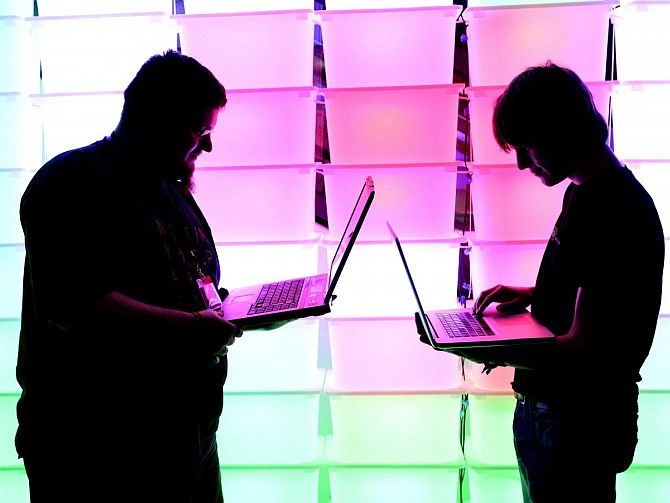Volunteers have been asked to provide details of their core competencies for future projects, says Mayank Mishra For Chandra Prakash, a city-based cyber enthusiast, May 16 turned out to be memorable for more reasons than one.
For Chandra Prakash, a city-based cyber enthusiast, May 16 turned out to be memorable for more reasons than one.
Not only did the Bharatiya Janata Party (BJP), led by Prakash's "favourite leader" and prime minister-elect Narendra Modi, sweep the Lok Sabha elections, Prakash also received a "thank you" letter from the BJP leader.
The letter, digitally signed by Modi, said: "A big thank you for your wishes! You have been a source of immense strength and constant support through the campaign. This victory is as much yours as it is the BJP's and the NDA (National Democratic Alliance)'s."
The letter also asked him to fill a form at www.narendramodi.in/form and be involved in future projects.
Prakash claims he is one of about 15,000 to have received letters thanking them for their contribution to the BJP's campaign on micro-blogging site Twitter.
These people campaigned for Modi, without being associated with the party in any form. They sent millions of tweets, as well as re-tweeted many of Modi's tweets, with the sole aim of "spreading Modi's vision".
Led by former UK-based mergers & acquisitions lawyer Manoj Ladwa, these were Modi's foot soldiers. Initially, one of the first tasks before Ladwa and his team was to identify on cyber space those who supported Modi's views and encouraged them to express their views more frequently.
"Perhaps, this was the reason I was identified as one of those supporters of Modiji who could be relied upon to spread his message of hope in cyber space," says Prakash.
Now, Modi's team is banking on the same set of people to effectively communicate the decisions of a government led by him at the Centre.
This is just one of the many facets of the BJP's campaign that helped it exceed the magic figure of 272 seats in the 545-member Lok Sabha. In fact, the BJP's team of cyber soldiers helped the party notch up an impressive strike rate of 78 per cent in constituencies with sizeable populations of netizens.
Of the estimated 160 Lok Sabha seats with more than 10 per cent voters active on social media, the BJP won as many as 125 seats. This is a significant improvement compared to the 2009 Lok Sabha elections; at that time, the Congress had won 75 such seats and came second in another 43. The BJP could manage only 44 such seats.
This time, the BJP's cyber campaign managed to rope in about 10 million members; of these, 2.2 million became volunteers.
"It was a 360-degree campaign that helped establish continuous commitment to and constant engagement with voters. The key to its success was the work done by a large number of volunteers. It was an online campaign for success offline," says Arvind Gupta, chief of the BJP's national information technology cell.
The cyber army's method was simple: Campaign themes being expressed at press conferences of senior leaders, as well as Modi's speeches, had to be broken into parts and posted on Twitter, Facebook, WhatsApp and other fora, as audio-visual posts or simply comments. As the campaign gained traction, online donations, too, picked up, said party leaders.
The BJP received online donations from about half a million people which, it claimed, was a record of sorts.
During the elections, there was a massive surge in social media activity. According to reports, while last year saw 20 million tweets related to Indian elections and politics, in the first five months of this year alone, the figure touched the 58-million mark. On May 16, the day the election results were announced, a record two million such tweets were recorded, of which 750,000 pertained to Modi.
Facebook, too, saw a huge surge in election-related posts. A release from the social media site said, "From the day the elections were announced to the day the polling ended, 29 million people in India made 227 million interactions (posts, comments, shares and likes) regarding the Indian elections on Facebook. That's two-thirds the daily active Facebook users in India and an average of 10 interactions a person. In addition, 13 million people made 75 million interactions regarding Narendra Modi."
The online campaign, said some of the party's cyber volunteers, not only created a buzz online and offline, it also helped team Modi collect "valuable feedback from the ground".
"Initially, Modi's campaign in West Bengal was seen to be soft on Mamata Banerjee. Following feedback collected by volunteers, he started attacking the Trinamool Congress leader. This is just one of the many instances of Modi changing his focus of campaign after receiving feedback. In that sense, he is very flexible and alive to public opinion," says a volunteer associated with the campaign.
Team Modi's campaign managers and cyber volunteers say their job is just half done. The day the election results were out, his campaign team, apart from sending out 'thank you' letters, also added two new features to Modi's official website - a victory wall asking people to post their comments on the verdict, and an online form that sought details of the core competencies of such people so that their services could be used in the future.
"Through these measures, Modiji has ensured only is his campaign unique, his style of governance, too, will be unique, with wider participation of the people," says Chandra Prakash, one of the first to fill the form.
Prakash, along with other volunteers, is hopeful unlike previous governments that suffered because of the lack of an effective strategy to connect with the people, the Modi government will have no such handicap.










 © 2025
© 2025